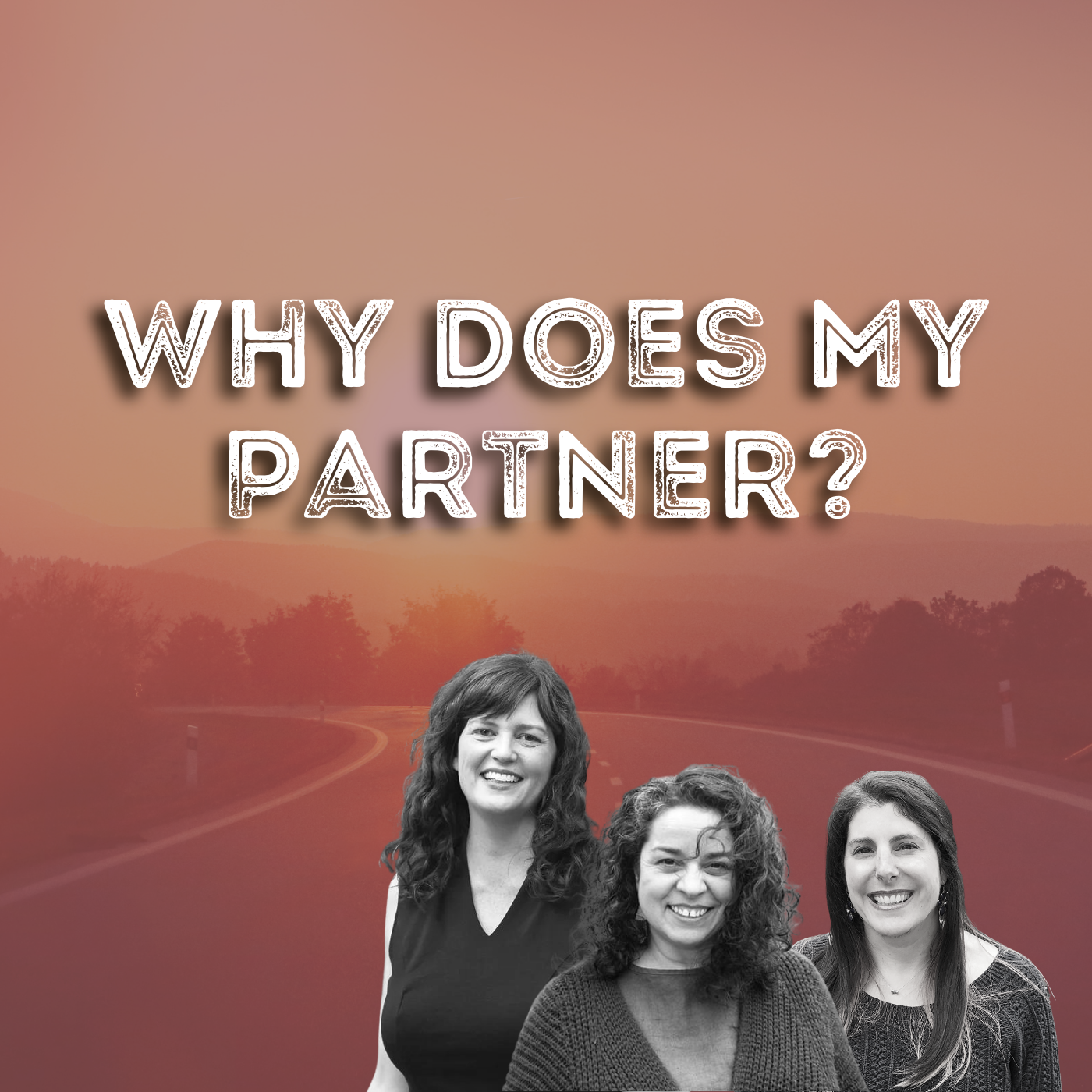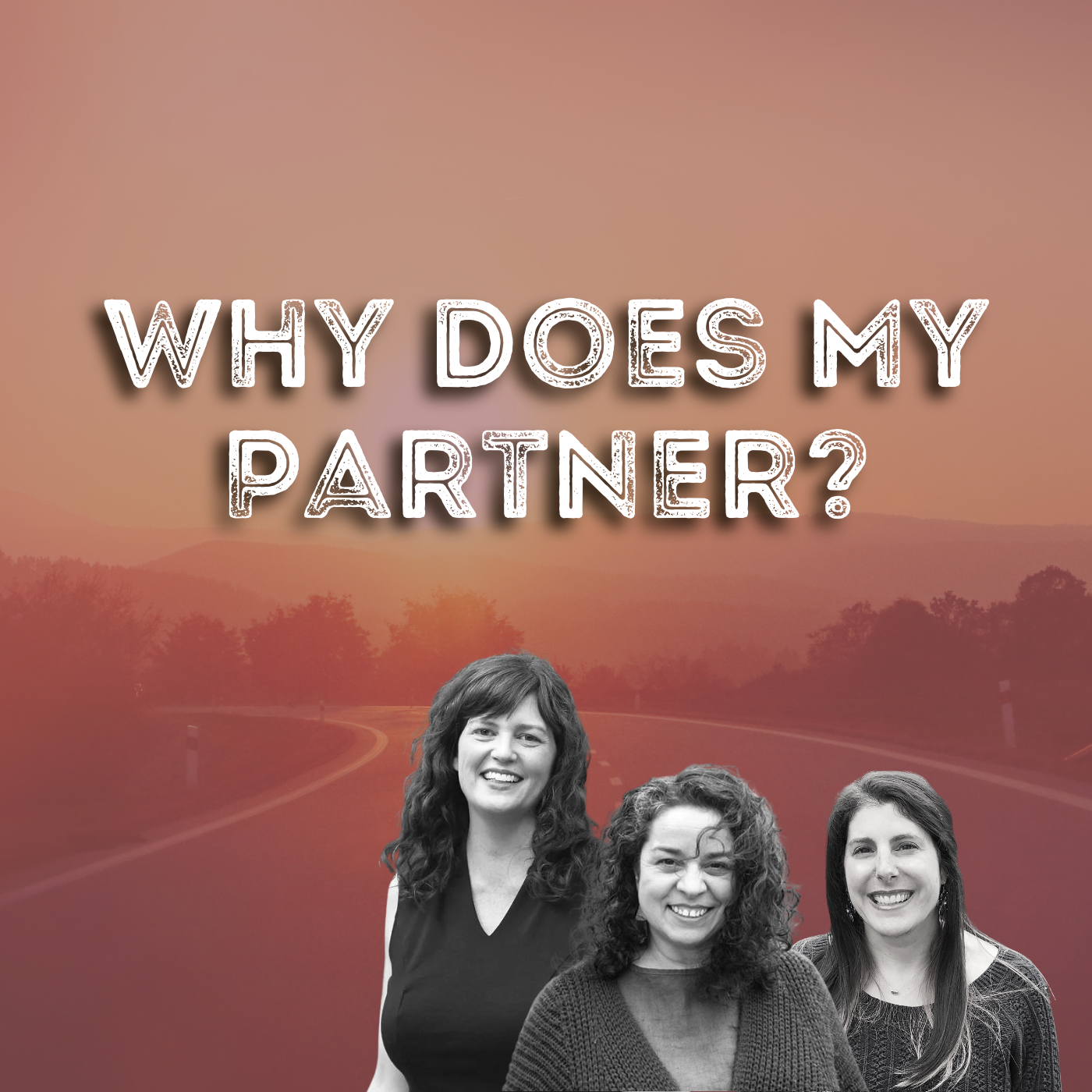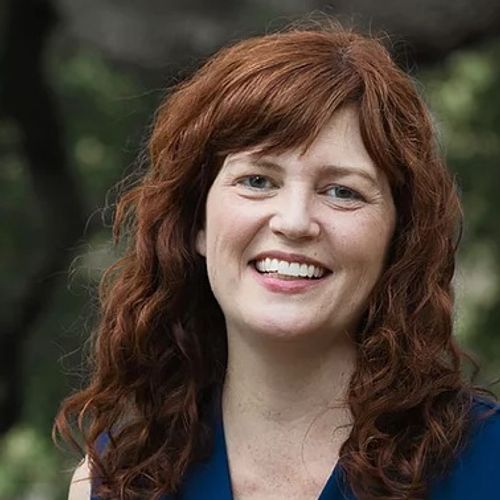Episode 102
Give Me Anxiety
Anxiety is a signal that’s really good at letting you know something isn’t working – the only thing is, it’s not so good at pointing out exactly what that thing is. Diving into today’s question about anxiety in a relationship brings us to unpacking just what anxiety is, attachment styles, culture and epigenetics, and a whole lot more. We also talk about what it means to stop fighting your anxiety and begin to change your relationship to it, and how that can have results that resonate far wider than you might think.
Quotes:
“It’s contagious. It's really hard to be with someone who's anxious and not either feel anxious also or have a desire to turn away...or get them to stop it...or try to fix it, or fix them.”
"When anxiety is coming at you, it's really, really overwhelming, and you either join it, or you try to change it, or you try to leave it."
This episode is brought to you by our amazing sponsor, The Academy of Therapy Wisdom. Jules is one of their many educators, and because you listen to us, the Therapy Wisdom team is offering a secret code to give you free access to one of Jules' 1 hour Wise Conversations. Just visit therapywisdom.com and use the discount code "WDMP."
Jules' new book is out now! Buy Setting Boundaries that Stick: How Neurobiology Can Help You Rewire Your Brain to Feel Safe, Connected, and Empowered wherever books are sold.
Share your questions with us at whydoesmypartner.com/contact
If you want to dive in deeper, consider attending our upcoming workshops. Learn more at whydoesmypartner.com/events
Transcript
Welcome to the Why Does My Partner podcast.
2
:I'm
3
:Vickey: Jules.
4
:I'm Vicki.
5
:Rebecca: And I'm Rebecca.
6
:We're your hosts.
7
:We're also couples therapists
and messy humans bumbling
8
:through our own relationships
9
:Vickey: every day.
10
:We met at a training, and our
secret sauce is that we, and our
11
:partners, became fast friends.
12
:Between us, we have more than 40
years of experience holding hard
13
:relational questions with our clients.
14
:We're going to bring those questions here.
15
:And together, we're going
to take a stab at answering
16
:Jules: those questions.
17
:This podcast is not a
substitute for couples
18
:Vickey: therapy.
19
:If something you hear in this podcast
stirs something deep within you
20
:about your relationship, reach out
to a couples therapist in your area.
21
:Rebecca: We also love to hear
your questions, so don't forget
22
:to go over to whydoesmypartner.
23
:com to leave a question of your own.
24
:Here's today's question.
25
:Vickey: Welcome back.
26
:This is Jules.
27
:Rebecca: This is Vicki.
28
:And this is Rebecca.
29
:Today's question is, why does
my partner give me anxiety?
30
:And friends, This is me.
31
:Like, it's not my question.
32
:That's not what I'm saying here.
33
:But like, I am the partner
who gives my partner anxiety.
34
:I have this superpower.
35
:I am like a sorceress.
36
:I can cast these spells.
37
:Jules: You are
38
:Vickey: amazing.
39
:You're like magic.
40
:You're like, put anxiety in a package
41
:Jules: and hand
42
:Vickey: it on over.
43
:I am so good at this.
44
:Jules: Why on earth and
how does this happen?
45
:Rebecca: Well, it's contagious.
46
:Jules: Mm.
47
:Oh.
48
:Mm hmm.
49
:Mm hmm.
50
:That
51
:Vickey: is a good
52
:Rebecca: way to phrase it.
53
:Yeah.
54
:Mm hmm.
55
:Yes.
56
:Yeah.
57
:It's really hard to be with someone
who's anxious and not either feel anxious
58
:also or have a desire to turn away.
59
:Vickey: Yeah, because
I think I do it to you.
60
:Or get them to stop it.
61
:Rebecca: Yeah, or get them to, or try to
fix it, or try to fix them, or, yes, yeah,
62
:because, because when anxiety is coming
at you, I don't know, I probably picked
63
:it up in a lot of places growing up,
but, um, when anxiety is coming at you,
64
:Vickey: it's really, really
overwhelming, and you either join it,
65
:Rebecca: or you
66
:Vickey: try to change it,
or you try to leave it.
67
:I was going to say run
away, but just leave it.
68
:So yeah.
69
:Yeah.
70
:Jules: So you join it,
change it, or leave it.
71
:So if you, Collar, are the person
who is joining, then your partner
72
:gave you anxiety, you picked up that
package and ate it like ice cream,
73
:nom, nom, nom, nom, nom, nom, nom.
74
:And you probably can't even
help it, is what you're saying.
75
:Am I getting it?
76
:Rebecca: Yeah.
77
:Well, it's, it's.
78
:It's in the air.
79
:So like you're responding to
something that's in the air.
80
:Yeah.
81
:It makes complete sense that
your partner's giving you anxiety
82
:if you have an anxious partner.
83
:Yeah, yeah.
84
:That makes sense.
85
:But also, like I think, I think like
we need to figure out like what,
86
:can we back up at like 12 steps?
87
:What
88
:Vickey: is
89
:Jules: anxiety?
90
:Yeah.
91
:Yeah.
92
:What
93
:Rebecca: is anxiety?
94
:Yeah.
95
:I think, I think even like the
three of us might have slightly
96
:different definitions of what anxiety
97
:Jules: is.
98
:Probably.
99
:Slightly.
100
:I mean, the first thing that comes
to me is just how many clients I've
101
:had in my own system, my partner,
all, all the people, friends.
102
:And they say, well, I have
really bad anxiety right now.
103
:And if I stop and ask,
what does that mean?
104
:I get a different answer every time.
105
:What I'm catching is that we use that
word to mean a lot of different things.
106
:So that's my like knee
jerk response to it.
107
:Mm hmm.
108
:Yeah.
109
:Rebecca: So, for the purpose
of this episode, I think we're
110
:kind of categorizing anxiety in
like a worry category, right?
111
:But I, I also want to share with, with our
listeners that in my own system, as I have
112
:moved into greater and greater wellness
and into a deeper relationship with my
113
:anxiety, I have come to learn that my
anxiety is actually high degrees of care.
114
:It's like, I'm super caring.
115
:I'm caring so freaking much.
116
:Yeah.
117
:Vickey: Mm hmm.
118
:You care about things going well.
119
:You care
120
:Jules: about your loved ones.
121
:You care.
122
:You
123
:Rebecca: care so much.
124
:I care
125
:Vickey: so much.
126
:What happens?
127
:What does like your anxiety
look like because you care
128
:Rebecca: so much?
129
:No, it looks like anxiety
because I care so much.
130
:Oh, okay.
131
:Vickey: Okay.
132
:Well, and
133
:Jules: so it could be anything.
134
:It could be like you're
getting on a plane.
135
:And by the way, I'm
really anxious about you.
136
:We're going to get to the airport in time.
137
:Do we pack everything we need?
138
:And also what's going
to happen to the plane?
139
:What happens if the plane isn't on time?
140
:Are we going to make our connection?
141
:It could be that kind of,
am I getting it, Rebecca?
142
:You're getting it.
143
:Okay.
144
:Rebecca: You're getting it.
145
:Okay.
146
:I have to like my, my I don't, I
don't want to like make this all about
147
:anxiety, but like my trick in here is
actually to shift what I care about.
148
:Nice.
149
:Right?
150
:So like, do I care about getting
to the plane on time or do I care
151
:about having an awesome journey
with the people that I'm with?
152
:Ah, okay.
153
:Vickey: Right?
154
:So you shift your focus.
155
:That's what you're saying.
156
:I
157
:Rebecca: shift what I care about.
158
:Yeah.
159
:Okay.
160
:Vickey: That's right.
161
:Yeah.
162
:Jules: But yeah, cause you can't
actually turn off the care.
163
:So then,
164
:Vickey: okay, wait, wait, wait, this
is, this is so genius and this is like
165
:bonus for all the listeners out there.
166
:I cannot turn off the care.
167
:Not even a little bit.
168
:That reaction was awesome.
169
:Jules: By the way.
170
:I'm sorry.
171
:Okay, I love this, because by
the way, if you push down that
172
:anxiety, then you're pushing down
your big, heart caring, loving
173
:Vickey: self,
174
:Jules: and it goes,
175
:Vickey: No!
176
:And makes it worse,
177
:Rebecca: because it doesn't
want you to push the care away.
178
:I'm going to do one of three things
if I have to push my anxiety away.
179
:I'm either going to totally freeze.
180
:Because I don't know what the
heck to do if I can't care, and
181
:my heart's going to go cold.
182
:I'm going to get really big and loud
and lash out at myself, at you, at
183
:the world, at the person that gave
me a ticket to the airplane, right?
184
:Like, I'm going to lash out everywhere, or
I'm going to run the heck away because I'm
185
:rejected and the world doesn't want me.
186
:Aww.
187
:Sweetie.
188
:Because I care too much.
189
:Yeah.
190
:And nobody else cares.
191
:You know, so it's like.
192
:Yeah.
193
:It's the care.
194
:And for me, it's care, but this
is also like really been like an
195
:earned way of seeing my own anxiety.
196
:It's not, it's certainly
not a place I started.
197
:And if I, um, when I think
about this question, why does
198
:my partner give me anxiety?
199
:Um, this was me.
200
:I don't think my partner and I are
in the same place now because we
201
:understand my anxiety differently.
202
:Because I understand my, because my
relationship to it is different, right?
203
:So it doesn't do the
same thing in my partner
204
:Jules: anymore.
205
:Yeah.
206
:Yeah.
207
:So you shifted your relationship
with your anxiety first.
208
:Yes.
209
:Then you started talking to
him more about it as you're
210
:Rebecca: shifting.
211
:No, I shifted my
relationship to my anxiety.
212
:And then he shifted his
relationship to your anxiety.
213
:And then it shifted.
214
:Oh, and then it shifted.
215
:Jules: Mm hmm.
216
:Mm hmm.
217
:Yeah.
218
:That makes a lot of sense.
219
:And so then you're not giving
him your anxiety so much.
220
:Mm hmm.
221
:Rebecca: Mm hmm.
222
:Because my relationship is different.
223
:It's not something to give.
224
:It's something to understand.
225
:It's something to process.
226
:Jules: That makes total sense.
227
:Yeah.
228
:It's a great way
229
:Vickey: to phrase it, too.
230
:It's something to
231
:Jules: understand.
232
:Totally.
233
:So that's possibly what's happening.
234
:But there are other things that
are possibly happening too.
235
:So if your partner is not anxious and
you are on the receiving end of their
236
:behavior and you are getting anxiety,
there's a, there's not another option.
237
:So it could be that there's something
in their behavior that is pulling
238
:on the implicit threads Of your own
history and, and the, the neural
239
:networks that are coming to answer
that little tug are full of anxiety,
240
:maybe over care, maybe worry right?
241
:Not over care.
242
:I don't mean it like that.
243
:It's like a, the high degree of care.
244
:I wanna say it the way you say it.
245
:'cause I like it.
246
:'cause I don't think it's actually
over that, that doesn't feel right.
247
:But it's that high degree of care.
248
:So it could be that.
249
:So it could be that, whoo, there's some
fear or some worry, it's kind of energy
250
:attached to whatever they're reminding you
of from your own history, and you don't
251
:even know what it is, because it's totally
252
:Vickey: subconscious.
253
:Subconscious.
254
:That's what I was going to say.
255
:It's that it's reminding
you subconsciously of
256
:something from your past.
257
:Yes.
258
:You can poetically say
it better than that.
259
:Well, that's a quick way.
260
:But implicit thread, right, well,
implicit threads is beautiful and poetic.
261
:And then there's like just subconscious
262
:Jules: reminders.
263
:You, you're getting subconscious
reminders, but the thing is, is that
264
:you don't get to get to know that
you're living in memory in that moment.
265
:It just feels like
they're making you crazy.
266
:Rebecca: Can I, can I add a piece in here?
267
:Because I think, um, culture
plays a big piece in this, not
268
:just culture, but epigenetics.
269
:And depending on where
our peoples come from.
270
:Mm hmm.
271
:I think some cultures run more
hot, run more anxious than others.
272
:Absolutely.
273
:And, um, Oh, no, there's proven.
274
:Yeah.
275
:So, so there are some, some groups of
peoples who are going to like, it's, it's,
276
:it's going to come through the line and
you won't have like memory memories, but
277
:you'll have some kind of cellular memory.
278
:Jules: Yeah, it's a genetic, uh
mm-Hmm, , it's a shift in the way
279
:the histones on your DNA are making
your DNA fire in a particular way.
280
:And so actually you could be in that way,
wired for a little bit more anxiety, and
281
:that would be common if you have ancestry
that was, um, in, in any way, uh, the
282
:target of systemic oppression, genocide.
283
:Any, any, any horrible attacks.
284
:Also, uh, famine.
285
:That's a common one.
286
:So if you come, if you come from spaces
where maybe there was a lot of life
287
:threat for one reason or another, um,
it, you, you might have more anxiety.
288
:So that's normal.
289
:Yeah.
290
:The other thought I was having
was, if you're in that, um,
291
:Vickey: if you,
292
:Jules: uh, I've, I've
talked a little bit on
293
:Vickey: our podcast about
attachment theory, you know, as a
294
:Jules: brief reminder, brief reminder,
I think of attachment quilts.
295
:Rather than attachment types, which
is just the way I think about it.
296
:When I look at the more complex
research in adult attachments, and I
297
:look at Crittenden's work, I read a
lot about this stuff, and I tend to
298
:not be overly categorical about it.
299
:So I think of it as like
you have an attachment quilt
300
:Vickey: and it has four colors in it
301
:Jules: and they're secure and then
these three types of insecure and you
302
:may have little squares of all the
colors, or you may be more dominant
303
:in one color or another color.
304
:So if you have more on the anxious end,
What that means is you're going to be a
305
:little bit preoccupied with worrying about
what's happening in the other person,
306
:if you can't figure it out, if you can't
manage how they're feeling or how they're
307
:thinking, because that's part of it.
308
:If you have anxious attachment, basically
what that means is you got exposed to a
309
:lot of stuff early on in your life where
you needed to manage the other person or
310
:take care of them in some way to get care.
311
:Vickey: And so you get really good.
312
:So
313
:Jules: that would create a habit.
314
:of trying to guess what's happening
in other people and trying to
315
:Vickey: manage what's
happening in other people.
316
:If you're a therapist listening
to this podcast, lots of us have
317
:a ton of this color in our quilt.
318
:We like to mind read
others and stuff like that.
319
:So,
320
:Jules: so we, we have a
321
:Vickey: lot of this kind of energy
where we're, we're really worried
322
:Jules: about how the other
person is thinking and feeling
323
:and being and da, da, da.
324
:And so, especially.
325
:One, that's just a nerve
wracking and anxious position.
326
:That's part of why it's called
anxious attachment because there's
327
:a lot of anxiety involved, but also
because you're trying to do something
328
:impossible, which is to manage the
internal experience of another human.
329
:And in
330
:Vickey: addition to that,
331
:Jules: um, if you have somebody who's
a little bit harder to read that lost,
332
:Ooh, that feeling can feel really scary.
333
:Yes, I can.
334
:But that may be part of where
your anxiety is coming from too.
335
:Rebecca: Yeah, that, that your,
your typical reading the other
336
:person's skills aren't working.
337
:Vickey: Right!
338
:That's a
339
:Jules: possibility.
340
:Or that, you know, when something's going
wrong, or like, I, I have clients who
341
:Vickey: do this, I've done
this in my own history,
342
:Jules: where you will have said a thing.
343
:And you think you set it a little bit
off and you just like ruminate on it.
344
:Like how did that land for them?
345
:Oh no, I hurt them.
346
:Oh no, I harmed them.
347
:And you just go
348
:Vickey: down an anxiety swim, down
your anxiety river, just get swept away
349
:Jules: in the worry about
how you're affecting people.
350
:So that's another possibility.
351
:And then the other one I was thinking
about was, well, you could be catching
352
:intuitive Yeah, your own intuition
353
:Rebecca: and reading it as anxiety
because you're, you're caring about
354
:or worried about or preoccupied with.
355
:And there, there might
even subconsciously, yeah,
356
:even subconsciously, right.
357
:There might be some confusion about what
your, the senses that you're picking up.
358
:If you're not, if you're not
in relationship with like, oh,
359
:what's happening right now,
what's happening inside of me,
360
:what information am I getting?
361
:How, how am I digesting that?
362
:What's, if you're not there,
you're just going to read it
363
:Jules: as Yeah, and I don't want
listeners of this podcast to get carried
364
:away with what I'm about to say, but
I do want to give it as an example,
365
:just in case this is happening to you.
366
:And most people, this is not what's
happening, but for some people it will be.
367
:And so I want to mention it sometimes
when I've, um, uh, done work with a
368
:couple, the one partner is feeling
lots of anxiety and it turns out
369
:the other one is having an affair.
370
:And there was tons of little
implicit scraps of information that
371
:their subconscious was catching.
372
:Remember that medulla oblongata
is taking in millions of bits
373
:of information per second.
374
:You're not catching all of that.
375
:Your lower brain, your
subconscious is catching it.
376
:So there are times when my
partner's giving me anxiety
377
:because something's really wrong.
378
:Or there
379
:Vickey: was this one
time where somebody was
380
:Jules: squirreling away money.
381
:Mm hmm.
382
:And planning on leaving.
383
:It wasn't an affair thing, but
they were planning on leaving.
384
:There were some weird, like, lying stuff
happening, and the other partner's super
385
:anxious and feels like they are missing
something and they can't, they're just
386
:Vickey: feeling
387
:Jules: icky and overwhelmed and
kind of anxious all the time.
388
:Well, they were actually
catching that something was off.
389
:Yeah.
390
:So it could be that.
391
:It could be you're having a real worry
that's attached to something real.
392
:Mm hmm.
393
:Oof, so that's all sorts of things
394
:Rebecca: that could be going on.
395
:It's all kind of mixed up in there, right?
396
:Yeah.
397
:It's tough.
398
:Yeah.
399
:And I want to just kind of like give
one more like piece in here for our
400
:listeners because we're talking about
this like quilt of anxious attachment.
401
:I just want to name that there's this
other thing also that we call like earned
402
:secure attachment that a lot of folks can
like work towards and that's like another
403
:color that can be added to the quilt.
404
:Vickey: You know what I think of?
405
:I think of it as like my secure
thread and I threaded new patterns
406
:in all of my insecure quilt colors.
407
:Jules: And so, so I think of, I don't know
408
:Vickey: why, but I call my secure,
I call my secure, um, attachment
409
:Jules: squares green.
410
:And so I imagine that I
411
:Vickey: have a quilt with lots
of different colors, but a bunch
412
:of my colors that are not green
have green thread embroidery
413
:Jules: all over them.
414
:Right.
415
:Because I've helped greet them well, and
so there is, don't worry if you have a,
416
:a quilt that has a lot of insecure colors
in it, that does not mean all is lost.
417
:That's not a thing.
418
:Rebecca: Right.
419
:And, and I kind of want to just like hold
gently the, this piece I introduced at the
420
:top of this podcast about the way that I
now see it and relate to my anxiety around
421
:it being this kind of super care power.
422
:Because that, that's my green thread.
423
:Mm hmm.
424
:Mm hmm.
425
:Right?
426
:Yeah.
427
:I understand it now.
428
:Yeah.
429
:I think it's possible for all of us, for
everybody to kind of get to know these,
430
:these parts that are harder to be with
and to build relationship with them.
431
:And in doing that, we
create those green threads.
432
:Yeah.
433
:Vickey: Well said.
434
:Mm hmm.
435
:So let's I'll leave it there for today.
436
:Yeah.
437
:Mm hmm.
438
:Rebecca: Take care, y'all.
439
:Vickey: Thanks for being with us.
440
:Bye.
441
:Bye.
442
:That wraps up this week's episode.
443
:Join us again next week
for another, why does my
444
:Rebecca: partner?
445
:We hope that you continue to listen
wherever you get your audio and
446
:that you'll follow the show to
447
:Vickey: go deeper.
448
:Join us at one of our workshops.
449
:You'll find our next date
at white as my partner.
450
:com.
451
:Did you know you can
ask us your questions?
452
:Your questions are relational
453
:Rebecca: gold.
454
:Go to whydoesmypartner.
455
:com to either write in
or record your question
456
:Vickey: for a future
457
:Jules: episode.
458
:And here's some
459
:Vickey: gratitudes.
460
:Thanks to Al Hoberman, our sound editor
and podcast production magic maker.
461
:Thanks to every one of you who has
joined us for our workshops in the past.
462
:We've learned so much from all of you.
463
:And
464
:Rebecca: thanks to everyone who's
reviewed the show on Apple Podcasts.
465
:Your reviews help others to find the show.
466
:Take care of
467
:Vickey: each other best you can.
468
:See you next time.
469
:Transcribed




